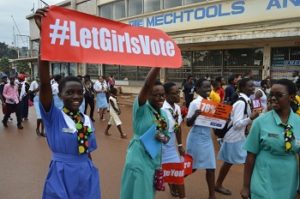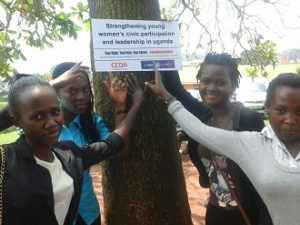Project
Grassroots Gender Accountability in Uganda
- Uganda
- May 2017
The project worked to help women district councillors acquire knowledge and to push the equality agenda with policy makers. The project’s advocacy activities led to improved gender-sensitive service delivery, as the local government budgeted for enhanced services for women and girls. In September 2016, two years after the end of the project, the Government announced that gender sensitive indicators will be used to ensure that all sectors adhere to gender equality in decision making and service delivery in the country.. Visibly empowered district and sub-county councillors expressed with pride their new influence on the gender-sensitive application of laws, policies and local budgets. Former women MP trainees proudly cooperated across party lines on priority issues of the Ugandan women in parliamentary committees.
The approach of putting in place a monitoring system that was run by Village Budget Clubs (VBCs) and district councillors alike was appropriate. The project’s training methodology ensured the transfer of necessary skills such as gender-sensitive analysis, budgeting, caucusing, lobbying and advocacy.
English
Lessons from Project
💡
- Women's empowerment
- Uganda
- May 2017
Projects should have a strong Monitoring, Evaluation and Learning system embedded in the project design with an appropriate budget to support it. There is also need for each project to have a baseline survey, mid-term evaluation and end-line evaluation on the same sample of project beneficiaries for consistence and to clearly trace results and impact.
💡
- Women's empowerment
- Uganda
- May 2017
A stakeholder mapping and analysis conducted before the beginning of the project and updated during the project implementation would have helped to identify relevant stakeholders. The systematic use of the findings from such an analysis would have helped identify synergies related to the advancement of women’s political leadership, representation and participation and minimized the risk of duplication interventions.
 ]
]
💡
- Women's empowerment
- Uganda
- May 2017
Male perceptions regarding the risks encountered by politically empowered women within their communities need to change. Active involvement of men and boys in the needs assessment would have helped in identifying from the very beginning, specific risks related to sexual and gender based violence that challenged the project, and would have helped gain active support of young men in preventing SGBV and discrimination against young female leaders in Uganda.
💡
- Women's empowerment
- Uganda
- May 2017
Six months after the end of the project in Uganda, beneficiaries were still expecting financial support and guidance from the grantee. Systematic and active involvement of the project beneficiaries during various follow-up activities could have enhanced their ownership and ensured their long term commitment to the project activities and results.
💡
- Women's empowerment
- Uganda
- May 2017
Although the project partnered with universities in rural areas most activities were implemented from Kampala. Sixty three per cent of the project beneficiaries interviewed expressed an urgent need to reach more young women in rural areas of Uganda where the implementation of affirmative action is very limited. The project could have had a more significant impact if interventions had been stronger in rural areas.

💡
- Women's empowerment
- Uganda
- May 2017
The international grantee involved implementing partners in Uganda – namely ten universities in three target areas – from the very beginning, in the design of the project objectives. This enabled good support during project implementation and a certain degree of ownership of the results among the universities. However, the project might have been more efficient at the implementation stage if a detailed memorandum of understanding among the partners had been formulated defining roles and responsibilities.
💡
- Women's empowerment
- Uganda
- May 2017
The project successfully established mentoring clubs in 10 public and private universities located in five districts in Uganda all of which are still functioning six months after the end of the project. More than half of the project beneficiaries interviewed indicated that they were still active as mentors supporting other young women.

💡
- Interaction with government
- Uganda
- April 2014
Although written in English, Village Budget Club members found the budget monitoring and service tracking manual easy to use, because (i) English-speaking training facilitators were recruited from within the local community to address possible language and literacy issues; and (ii) at trainee stage, monitors teamed up in pairs comprising of one English speaker, thus enabling easy reference to the manual as and when needed
💡
- Interaction with government
- Uganda
- April 2014
Due to a lack of pertinent target indicator data the grantee fails to establish the extent to which district budget resources allocated to gender-specific projects have been increased. The grantee also failed to present data to demonstrate how media involvement increased grassroots’ ability to challenge the current state of local service budgeting and delivery.
💡
- Interaction with government
- Uganda
- April 2014
Investigative journalism was intended to critically review shortcomings discovered by VBCs throughout the project’s target districts; TV and radio shows were meant to overcome the lack of interfaces between the local population and duty bearers and to serve as a strategy for increased accountability. Furthermore, NGOs are still inviting the grantee’s Kibaale field officer to radio shows to share the approach and achievements of the monitoring work with a wider audience. One particular radio station has even offered free airtime. There is hence relevant impact towards transparent, gender-responsive local service provision in the form of vivid online readership discussion and comments in relation to the project’s investigative journalism outputs.
💡
- Interaction with government
- Uganda
- April 2014
Visibly empowered district and sub-county councillors expressed with pride their new influence on the gender-sensitive application of laws, policies and local budgets. Former women MP trainees proudly cooperated across party lines on priority issues of Ugandan women in parliamentary committees. The project’s most remarkable achievement wasthe newly introduced legal requirement that future drafts of the country’s annual budget need to be certified as gender sensitive prior to parliamentary approval.
💡
- Interaction with government
- Uganda
- April 2014
The fact that budgeting is usually based on annual cycles always comes to play when new service needs are discovered. Village Budget Clubs in at least 3 of the 4 target districts as a result of their local service monitoring activity had launched initiatives to fund identified service needs privately, should they face limited availability or flexibility of public financing.
💡
- Interaction with government
- Uganda
- April 2014
All Village Budget Clubs and caucuses of women councillors from the districts of Gulu, Kibaale and Kibuku, continue to use the monitoring approach to jointly identify and address gender-specific local service needs. There are individual cases, in which Village Budget Clubs (VBC) have shared their knowledge with neighbouring counties, whose representatives visited to observe VBC members during the conduct of service monitoring assignments.